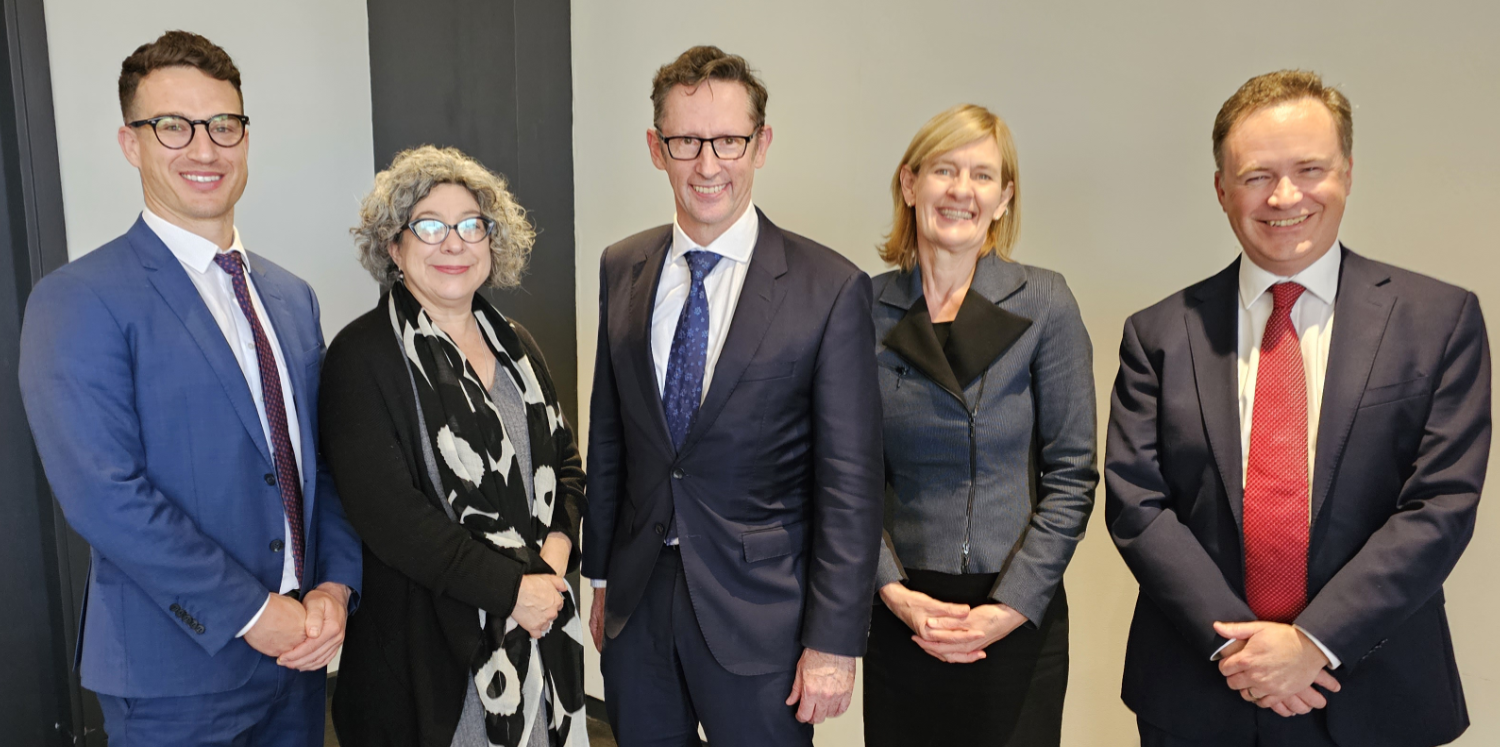
In this Issue
-
CEO's Corner by Andy White
-
- Update on payments reforms
-
- 2023-24 Federal Budget
-
- Retail Payments Statistics
-
- SMS Sender ID Registry
-
ECF update
-
- 2023-24 Federal Budget
-
- National Anti-Scam Centre (NASC)
-
- Economic Crime Forum
-
- AFR 2023 Banking Summit
-
Authorised Standards-Setting Body
-
eConveyancing Code
-
ISO 20022 migration
-
Cross-border payments
-
Safety of mobile payments
-
Stakeholder engagement update
-
- Stakeholder Advisory Council
-
- Cheques
-
AusPayNet Summit 2023
-
New members
-
Stay up to date!
-
AusPayNet contact details
CEO’s Corner
For anyone who has ever had to do it, moving home is a time for both reminiscence and anticipation. So, it is at AusPayNet, as we say goodbye to our Barangaroo office – our home for the last six years – and look forward to our future at Grosvenor Place, 225 George Street, Sydney.
We moved into Barangaroo on 19 May 2017 and exited exactly six years later, on 19 May 2023. Looking back, those six years feel significant. In 2017, we held our very first Australian Payment Summit. This has grown over the years – despite COVID-19 – to become the industry’s flagship annual event and a cornerstone of the insights pillar of our strategy. Our most recent Summit at the end of last year was sold out – attracting 450 attendees – and references to it appeared more than 100 times in print and broadcast news.
Notable landmarks within the standards pillar of our strategy in the last six years have included:
- finalising the first version of our open loop transport payments framework in 2017
- launching our card-not-present fraud mitigation framework in 2018 (effective from 2019), which has seen card fraud decrease from 75.0c per $1,000 in 2018 to 57.3c in 2021
- publishing our world-first guidelines for accessibility in PIN entry on touchscreen terminals on 3 December 2019 (International Day of People with Disability)
- announcing industry agreement to increase contactless card PIN limits in 2020 to help reduce the risk of COVID-19 transmission
- in 2022, publishing our guidelines to facilitate Australian QR Code payments.
Probably the most radical evolution of our role has occurred through the transformation pillar of our strategy, starting with the publication of our Future State of Payments Action Plan in 2020, and incorporating the addition of significant program management capability, which culminated – thus far – in the ISO 20022 Industry Migration on 20 March this year. As I’ve said elsewhere, this was an incredible effort by the team and the HVCS members to ensure that the industry was ready not just once but (given the European Central Bank’s delay) twice to go-live on time, on budget, and with no significant teething problems.
Looking forward, the work over the last six years provides the platform for AusPayNet to continue to deliver value to the payments industry and its end-users. Within the insights pillar of our strategy, we – as an ecosystem – have a generational obligation to solve for scams, which currently affect far too many Australians. We – as a country – also have a generational opportunity to assist in these efforts by getting the regulatory settings for payments right. That work will start later this year, with consultations on changes to the Payment Systems (Regulation) Act and on the new licensing regime for payments.
This work on regulation will also form the bedrock of the key initiative within the standards pillar of our strategy, namely, to become an authorised standards-setting body (ASSB) for payments. This role will become increasingly important over time, as the ASSB sets the minimum core standards for payments licensees, thus protecting consumers and supporting innovation. More immediately, under our standards pillar, we will soon launch our first new framework since 2010, the eConveyancing Framework.
Finally, on the transformation pillar of our strategy, we will continue our work managing the consumer-led decline in cheques, leading the thinking on the future of the BECS Framework, and managing the ISO 20022 coexistence period through to November 2024. We are also completing work on the program initiation document for the Advanced Encryption Standard (AES) migration. Once initiation is approved, the AES program itself will be a significant industry undertaking, given it affects almost one million POS terminals, around 25,000 ATMs, all hardware security modules and all card networks in between.
So, while we can look back proudly at our time in Barangaroo, we are excited about times ahead, as we remain firmly focused on adding value to the Australian payments industry and its end-users. We are looking forward to rolling out the welcome mat at Grosvenor Place soon!
Update on payments reforms
2023-24 Federal Budget
On 9 May, The Hon Dr Jim Chalmers MP delivered the 2023-24 Federal Budget. AusPayNet welcomes the funding announcements, with key items for the payments ecosystem including:
- Anti-Money Laundering (AML): $14.3m over four years from 2023–24 to support policy and legislative reforms to evaluate Australia’s AML framework and to harden Australia against illicit financing.
- Consumer Data Right (CDR): $88.8m over two years from 2023–24 to support the continued operation of the CDR in the banking, energy and non-bank lending sectors, progress the design of action initiation, and uplift cyber security.
- Cyber Security: $101.6m over five years from 2022–23 (and $11.8m per year ongoing) to support and uplift cyber security in Australia.
- Digital Identity: $26.9m to sustain and develop the next stage of the Digital ID program.
- Privacy: $45.2m over four years from 2023–24 (and $8.4m per year ongoing) for stronger privacy protection and enforcement.
- Scams: $86.5m over four years from 2023-24 to combat scams and online fraud (this allocation is discussed in further detail in our Economic Crime Forum update.)
It is also pleasing to see outlined in Budget Paper No. 4 the recognition and targeted coordination of policy on data and digital, cyber security, privacy, digital identity, and scams.
AusPayNet looks forward to continuing to work with the Government to enable competition and innovation, promote efficiency, and control and manage risk to deliver improvements for all users of the Australian payments system.
Response to Review of the Retail Payments Statistics
In February, the Reserve Bank of Australia (RBA) consulted with industry participants on a review of its Retail Payments Statistics (RPS) data collection. As the most comprehensive and timely source of data on Australia’s key payments systems, the RPS is an important resource for the industry, policymakers and the wider community. However, growth in new payment methods, business models and industry participants in recent years has led to information gaps in the RPS data.
In our submission to the RBA’s consultation, AusPayNet expressed support for updating the RPS in line with industry developments over the past decade. Given AusPayNet’s central role in the industry and our extensive use of the RPS data, we offered our assistance to the RBA as they work through this review. We believe that industry collaboration will be instrumental in defining a dataset that accounts for the complexity and dynamic nature of the payments industry without imposing undue burden on reporting institutions.
Response to Consultation on an SMS Sender ID Registry
In March, AusPayNet responded to the Australian Communications and Media Authority’s (ACMA) consultation on establishing an SMS Sender ID registry. The registry would aim to prevent scammers from impersonating trusted business and government brand names in text message headers.
AusPayNet’s submission expressed support for implementing a Sender ID registry in Australia, to help protect individuals and businesses against the increasing prevalence and impact of impersonation and phishing scams. We suggested a staged implementation approach, so at least some of the benefits of an SMS Sender ID registry could begin to be realised before a nationwide model can be fully operationalised.
AusPayNet welcomes the Government’s budget commitment of $10.9 million to establish and enforce an SMS Sender ID registry. We stand ready to continue assisting ACMA as it progresses the implementation of this initiative.
Economic Crime Forum (ECF) update
2023-24 Federal Budget
AusPayNet welcomes the Australian Government’s allocation of $86.5 million over four years to address the rising rate of scams, including:
- $58m over three years from 2023-4 to establish the National Anti-Scam Centre (NASC) within the ACCC to improve scam data sharing across government and the private sector, and to establish public-private sector fusion cells to target specific scam issues. AusPayNet will continue working with the ACCC on ensuring the ECF complements the functions of the NASC.
- $17.6m over four years from 2023-4 (and $4.4m per year ongoing) for ASIC to identify and take down phishing websites and other websites that promote investment scams, with costs to be recovered through levies under ASIC’s industry funding model. AusPayNet will engage with ASIC on the implementation of Netcraft technology to detect scam websites.
- As earlier stated, $10.9m over four years from 2023–24 ($2.2m per year ongoing) to ACMA and the Department of Infrastructure, Transport, Regional Development, Communications and the Arts to establish and enforce an SMS Sender ID registry, to impede scammers who seek to spoof industry and government brand names in message headers.
The National Anti-Scam Centre (NASC)
On 15 May, AusPayNet CEO Andy White and Head of Economic Crime Toby Evans attended the announcement of the NASC in Canberra, as well as a stakeholder roundtable with the ACCC, ASIC and Treasury to discuss the centre’s implementation, its use of fusion cells to target specific scam types, and cross-industry national anti-scam codes.

Economic Crime Forum (ECF)
The ECF continues to gain momentum as more industry and regulatory representatives from various touch points of the scam lifecycle join the group. The ECF is delivering impactful fusion and response tactics through three joint operational working groups, which aim to develop intelligence referrals and create disruption opportunities for law enforcement. These projects include UK accent bank impersonation scams, UK accent bond and term deposit scams, and remote access scams.
ECF workshops have delivered ‘follow the money’ intelligence packages to ASIC and compiled biometrics data of scammers that has been disseminated to UK partners. This data will be washed against offshore holdings to aid in the identification of criminal networks and their proceeds of crime. Industry and government representatives continue to provide positive feedback that the workshops are providing the opportunity for the kind of whole of ecosystem collaboration that is imperative in stopping scams at source.
Australian Financial Review 2023 Banking Summit
On 28 March, AusPayNet CEO Andy White appeared on the Scams, cyber and digital trust panel at the AFR Banking Summit, taking part alongside Ben Young, Westpac’s Head of Fraud; Bruce Young, APRA’s Executive Director, Technology and Data; Suneeta Sidhu, ASIC’s Acting Executive Director, Financial Services and Wealth; and Richard Harris, a partner at Gilbert + Tobin.
The panellists discussed the growing threat of scams, one of the biggest challenges currently facing the banking and payments industry. Talking about effective action to prevent nefarious activities, Mr White emphasised the need to stop scams at source, and the importance of the industry working together with digital platforms, telecommunications companies, internet service providers, government, regulators, and law enforcement agencies.
This was a well-received session that provoked some interesting audience questions at its conclusion.

AusPayNet’s program to become an Authorised Standards-Setting Body (ASSB)
Since the end of 2022, AusPayNet has developed and embarked on a program of work to enable us to become an authorised standards-setting body (ASSB), a concept endorsed by the government in response to the Review of the Australian Payments System.
The program of work comprises several key workstreams as follows:
| • Governance | • Enforcement | ||
| • Standards | • Monitoring | ||
| • Independence | • Authorisation. |
AusPayNet has been focusing on the governance and standards workstreams, primarily in:
- Considering the most appropriate company structure (and delegations) to adopt for AusPayNet’s future role as an ASSB
- Assessing its current regulations and guidelines, and existing processes for developing and approving standards, in an ASSB capacity.
As part of this work, AusPayNet is conducting an ongoing consultation process with the industry through various forums, stakeholder and member meetings. This consultation process will ensure the industry is kept informed on the program's progress and that any feedback is considered.
eConveyancing Code
Over the last year, AusPayNet has been working with its Members and other key industry stakeholders to create an industry framework for eConveyancing Payments.
This framework will provide governance over financial settlement of online property transactions and will be managed by a new AusPayNet management committee.
The procedures governing this framework are scheduled to be finalised by the end of June.
ISO 20022 migration
On 20 March, the HVCS successfully adopted the ISO 20022 message standard, marking one of the most significant transformations of the payments system in recent times.
Coordinated by an AusPayNet team, led by Program Director Robert Magee and Program Manager Mel Gauci, the migration is the culmination of four years of collaboration between regulators and participants in the Australian payments industry and has been completed in alignment with the global upgrade of the cross-border payments system coordinated by Swift.
ISO 20022 payment messages can carry richer, more enhanced and structured data, and so the migration means significant improvements to process-automation, interoperability and corporate customer experience in Australian payments.
Financial institutions will be able to create seamless experiences for corporate customers and ultimately deliver faster, cheaper, transparent and more accessible payments.
For a more comprehensive update on the progress of the ISO 20022 Industry Migration Program, please see our Migration Monitor newsletter.
Cross-border payments
Since delivering its Priorities for the next phase of work, the Financial Stability Board (FSB) has published its Priority actions for achieving the G20 targets. This articulates specific action items across the themes of:
- Payment system interoperability and extension
- Legal, regulatory and supervisory frameworks
- Cross-border data exchange and message standards.
Additionally, some further action items have been identified that cross all priority themes.
These actions – identified by the FSB, the Committee on Payments and Market Infrastructures (CPMI) and their partner organisations – will be foundational in helping deliver the quantitative targets of faster, cheaper, accessible and transparent cross-border payments. They also acknowledge the critical partnership and the cooperation required between the public and private sectors to deliver the targets, not just within the G20 but beyond.
The April edition of Cross-Border Payments Round-Up provides a summary of the FSB’s activities, responses to consultations and other actions being undertaken to support and successfully implement the roadmap and domestic cross-border payment priorities.
The safety of mobile payments
A Daily Mail article published last month warned Australians of “the dangers of saving their credit card details on their mobile phones so they have digital tap-and-go convenience”. In response to that article, we published a blog post that considered the purported dangers of mobile payments and demystified them, concluding that these payments are safe.
AusPayNet remains committed to ensuring that end-users of the Australian payments system are well-informed about the safety and security of the payment options available to them.
Stakeholder engagement update
Stakeholder Advisory Council
AusPayNet’s Stakeholder Advisory Council met for the eighth time in May. As a reminder, the Council acts as an advisor to our Board as we seek feedback from key stakeholders of the payments system who are not members of AusPayNet.
We have welcomed two new stakeholder organisations: Consumer Action Law Centre (replacing Financial Rights Legal Centre) as one of our consumer advocacy stakeholders, and Victoria State Government. We now have Federal Government (Treasury) and state government representatives on the Council, with NSW Treasury acting as Victoria’s alternate. The Council discussed three main topics:
- Treasury’s regulatory reform agenda
- Our proposed Governance Model as an ASSB
- Our role as an insights body for the ecosystem (including stakeholders).
As always, the feedback received was very valuable, and it will be shared at our next Board meeting.
Cheques
We recently held a member session on AusPayNet’s Customer-Led Decline of Cheques program. Almost 100 individuals from our member organisations attended the session that updated Members on the rate of decline of cheque usage, changes AusPayNet has made to its framework to enable choice, community outreach, and advocating for payment neutrality in legislation.
AusPayNet Summit 2023
We are excited to announce that the AusPayNet Summit will return to International Convention Centre Sydney (ICC Sydney) on Tuesday, 12 December 2023.
Following the sell-out success of our 2022 Summit, we look forward to bringing everyone back together for the Australian payments industry’s premier event. This year’s Summit promises to be bigger and better than ever before, so stay tuned for more information.
For details about sponsorship opportunities, email us at events@auspaynet.com.au.
New members
AusPayNet is pleased to welcome:
- Flash Partners Pty Ltd as a Tier 2 Member of BECS (effective 27 February)
- Till Payments Solutions Pty Ltd as an IAC Acquirer Member (effective 13 March).
For more information on AusPayNet membership, please visit our website.
Stay up to date!
Remember to follow AusPayNet on LinkedIn and Twitter to stay up to date with the latest news on the Australian payments system.
Additionally, we recently re-commenced the publication of regular blog posts, so make sure you subscribe to our mailing list to be alerted when blog posts and other new content becomes available.
AusPayNet contact details
As Andy White mentioned in CEO's Corner, we will be relocating to new premises. Our new office address is:
| Suite 2, Level 17 | |
| Grosvenor Place | |
| 225 George Street, Sydney 2000 |
We expect to commence working at our new location on Monday, 19 June.
All our other contact details (including our email, phone number and postal address) remain unchanged.


